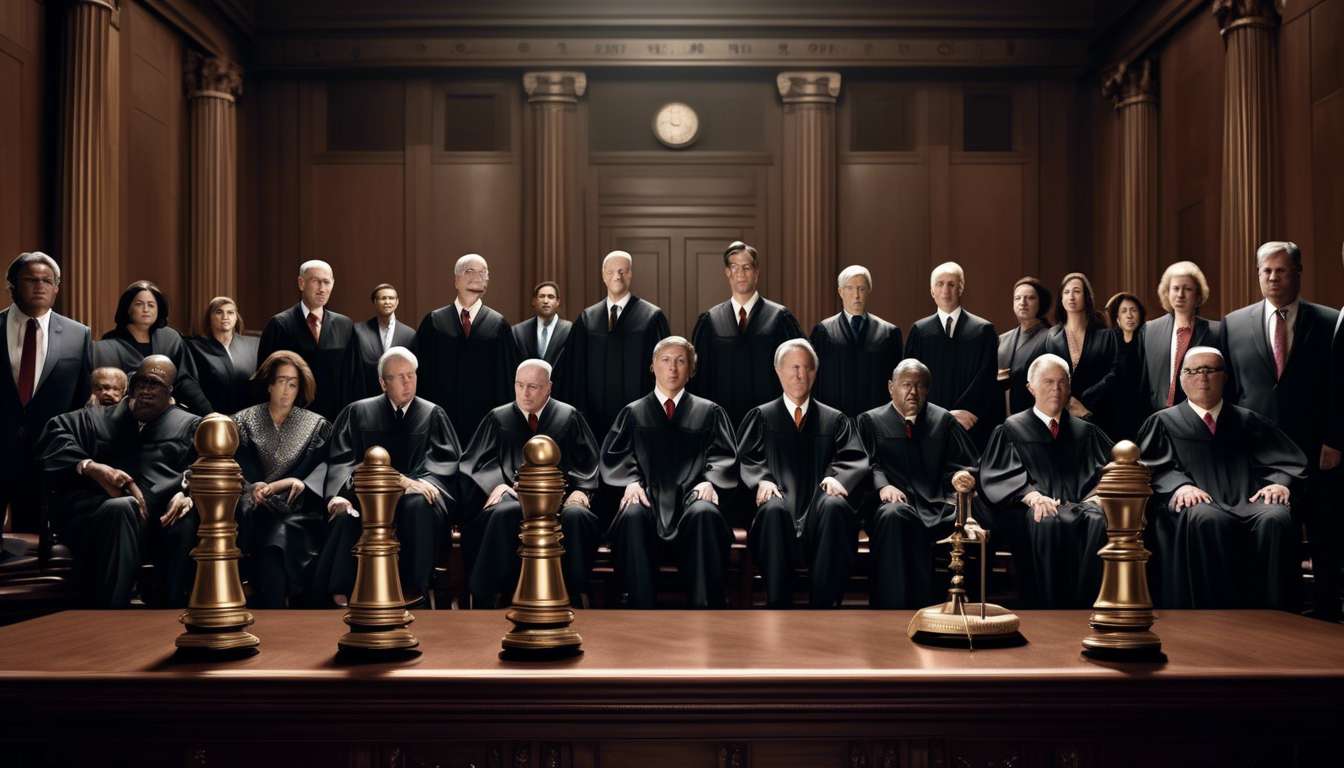In the wake of the Supreme Court’s landmark decision that paved the way for the legalization of sports betting across the United States, we find ourselves questioning the dynamics behind this monumental shift.
Focus on Dissenting Voices: Our attention turns to the justices who stood firm against the tide of change. Who were these justices, and what were their reasons for opposing the ruling?
Motivations and Principles:
- Together, we aim to uncover the motivations and principles that guided their decisions.
- Through a detailed analysis of the court’s proceedings and the arguments presented, we hope to gain a deeper understanding of the complexities involved in this legal battle.
Broader Implications of Dissent:
- By examining the broader implications of their dissent, we seek to illuminate the intricate balance between regulation, morality, and personal freedom.
- This balance underpins the ongoing debate on sports betting in our nation.
Invitation to Explore: Join us as we explore who voted against this transformative decision and why.
Justices Who Dissented
A few justices disagreed with the majority opinion, expressing their dissent on the decision regarding sports betting. In our shared quest for understanding, it’s important to recognize the voices of these dissenting justices. They stood firm, presenting a crucial legal opposition that echoed through the halls of justice. Their stance wasn’t just about opposing change; it was about upholding principles they believed were vital to our legal framework.
The dissenting justices were concerned about how state regulations might be impacted. They felt that allowing sports betting could undermine state efforts to regulate gambling within their borders. In our community, where we value the rule of law and the unique identities of our states, this perspective resonates deeply.
We understand that their objections weren’t merely procedural; they were rooted in a genuine desire to:
- Protect state sovereignty
- Maintain a balance between federal and state powers
Together, we reflect on these important dimensions of justice and regulation.
Reasons for Opposition
Several key reasons fueled the opposition, focusing on preserving state rights and preventing potential federal overreach. The dissenting justices were particularly concerned about the implications sports betting legislation might have on state autonomy.
Their stance stemmed from a desire to maintain a balance between federal authority and state independence, ensuring that state regulations could stand without undue interference.
Legal opposition wasn’t just about the merits of sports betting itself; it was more about safeguarding the principles that allow states to govern themselves effectively. By opposing the decision, the dissenting justices aimed to protect the integrity of state regulations, fearing that a shift could lead to a slippery slope of federal intrusion into areas traditionally managed by states.
Our collective identity thrives when local communities have the power to make decisions that reflect their unique values and needs. This opposition, then, wasn’t merely a legal stance; it was a statement about our shared commitment to local governance and autonomy.
Legal Arguments Presented
In the courtroom, several compelling legal arguments emerged, focusing on constitutional interpretation and the balance of power between federal and state governments.
We witnessed the dissenting justices articulate concerns about federal overreach, emphasizing how the federal government might be infringing upon state sovereignty. Their legal opposition was rooted in the belief that states should maintain the authority to regulate sports betting within their own borders, as granted by the Tenth Amendment.
The dissenting justices highlighted the importance of state regulations, arguing that each state should have the autonomy to decide its own stance on sports betting. They contended that this autonomy is crucial for respecting the diverse perspectives and needs of our communities across the nation.
Additionally, their arguments pointed out potential inconsistencies in how federal laws might apply across different states, which could disrupt the balance of our legal system.
These discussions reminded us of the importance of maintaining a careful equilibrium between state and federal powers, ensuring everyone feels represented and heard.
Moral and Ethical Standpoints
Many of us grapple with the moral and ethical implications of sports betting, as it raises questions about addiction, fairness, and the influence of gambling on society.
We understand the concerns shared by the Dissenting Justices who voiced legal opposition to the Supreme Court’s decision. These justices worried about:
- The potential increase in gambling addiction
- The impact on communities, particularly those vulnerable to the allure of easy money
Our shared values often emphasize fairness and integrity, and sports betting challenges these ideals. While some argue that legalizing it under state regulations could bring oversight and protection, others fear it may normalize gambling, leading to unforeseen consequences.
We find ourselves questioning whether the societal costs outweigh the benefits.
In this complex landscape, we seek a balance that respects individual freedom while safeguarding community well-being.
As a community, we strive to ensure that our values align with the decisions that shape our society and its future.
Impact on State Regulations
In various states, we’ve witnessed how the Supreme Court’s decision on sports betting has sparked a reevaluation of existing gambling laws and regulatory frameworks. This ruling has prompted us to consider how state regulations can balance economic benefits with ethical concerns.
As we navigate this evolving landscape, the voices of dissenting justices remind us of the legal opposition that still exists. These justices argued for a cautious approach, emphasizing potential risks and urging that changes respect both state sovereignty and communal values.
We’ve seen states taking diverse approaches:
- Some rapidly embrace the chance to boost revenue.
- Others proceed with more restraint, mindful of dissenting concerns.
This patchwork of regulations reflects our shared journey toward a solution that honors both innovation and tradition.
As we move forward, it’s essential that we, as a community, engage in open dialogue. This will ensure that our laws reflect not only legal precedence but also our collective ethos and aspirations.
Debate on Personal Freedoms
As we delve into the debate on personal freedoms, let’s examine how the Supreme Court’s decision has reshaped individual rights in the realm of sports betting.
Significant Shifts in Regulation:
- States have gained the power to regulate sports betting.
- This aligns with our collective yearning for autonomy.
- Discussions have been opened about where personal freedom ends and state regulation begins.
Concerns from Dissenting Justices:
- They highlighted potential risks such as gambling addiction and its impact on communities.
- Argued that state regulations might not sufficiently address these issues.
- These concerns have sparked legal opposition.
Despite these concerns, many see this as a victory for personal choice, empowering individuals to engage in sports betting under state guidelines.
We’re navigating a landscape where personal freedoms are celebrated yet balanced by necessary regulations.
As a community, we must ensure that:
- State laws protect individual rights.
- Societal well-being is safeguarded.
- A sense of belonging is fostered in this evolving legal framework.
Historical Precedents Considered
Throughout history, judicial decisions have often served as pivotal turning points in defining the boundaries of personal freedoms. The Supreme Court’s ruling on sports betting is a prime example, informed by a tapestry of historical precedents.
Dissenting Justices’ Role:
- Dissenting justices play a crucial role in shaping the legal landscape.
- Their legal opposition is not limited to the immediate case but upholds principles that resonate through time.
- By opposing the majority, they challenge us to reflect on the delicate balance between federal oversight and states’ rights.
State Regulations and Federal Oversight:
- Examination of past rulings reveals the evolution of state regulations.
- Highlights the ongoing tension between federal oversight and states’ rights.
The Importance of Rigorous Debate:
- Our legal system thrives on rigorous debate and differing interpretations.
- Dissenting perspectives are essential for a dynamic and adaptable legal framework.
Community and Legal Understanding:
- Understanding historical precedents fosters a sense of belonging within our community.
- As a collective, we navigate the complexities of law and liberty.
- Together, we honor the process that shapes our shared future.
Future Implications and Challenges
As we look ahead, the Supreme Court’s decision on sports betting will undoubtedly set new precedents that challenge both state and federal policymakers. We find ourselves navigating a landscape where dissenting Justices have voiced concerns that echo in legal opposition. These voices remind us that the balance between state autonomy and federal oversight is more delicate than ever.
In our communities, we must consider how state regulations will evolve. States now have the opportunity to craft their own sports betting laws, but with this power comes responsibility. We’ll need to ensure these regulations:
- Protect consumers
- Foster fair competition
Moreover, the decision opens the door for potential conflicts between states and the federal government. We must stay vigilant, as legal opposition may arise, questioning the limits of state powers.
By engaging in informed discourse, we can work together to embrace the benefits of this decision while addressing the challenges it presents. Our shared goal is to create a fair and sustainable future for sports betting.
Conclusion
As you wrap up this exploration into the dissenting justices on the sports betting Supreme Court decision, consider the diverse reasons behind their opposition.
The dissenting justices presented a range of perspectives:
-
Legal Arguments: Some justices were concerned about the interpretation of federal versus state powers, questioning whether the ruling overstepped states’ rights to regulate industries within their borders.
-
Moral Stances: Other justices voiced their opposition based on potential societal impacts, such as increased gambling addiction and its associated social costs.
Their viewpoints have sparked debates on state regulations and personal freedoms.
Looking ahead, the implications and challenges arising from this ruling will continue to shape the landscape of sports betting regulation in the future. Key areas to watch include:
-
State Legislation: States will need to navigate creating their own regulations, balancing economic benefits with ethical considerations.
-
Federal Oversight: The role of federal oversight may evolve, potentially leading to new legal battles or adjustments in national policy.
-
Social Impact: Continuous assessment of the societal effects of expanded sports betting will be crucial, including measures to mitigate any negative consequences.
In conclusion, the dissenting opinions highlight the complexity and ongoing nature of the conversation around sports betting in the United States.




